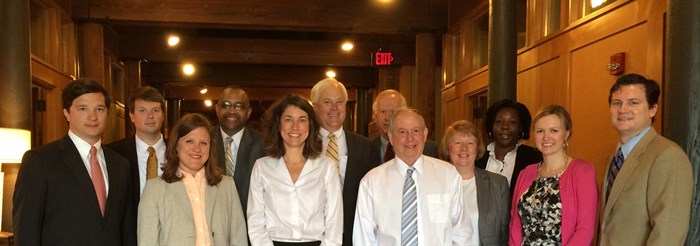John Belton O'Neall Inn Leaders


History of the John Belton O'Neall Inn
The John Belton O'Neall Inn of Court was formed late 1986 as the first such Inn in this state. It was inspired by a presentation at the Fourth Circuit Judicial conference regarding the Inn of Court program. Following that conference, Judges Clyde Hamilton and Cam Currie, then district and magistrate judges respectively, pulled together an "executive committee" including themselves, I.S. Leevy Johnson, Alex Sanders, Charlie Randall and Steve Morrison.
Their first meeting was in a booth at the Elite Epicurean. They quickly settled on a list of "Masters" to invite for membership. In an Inn structure, Masters are the most senior members. Other members include "Barristers," who are the younger but still experienced lawyers, and "Pupils," who are the most junior attorneys or law students. In this Inn, a decision was made to set aside a fairly large percentage for law students as the "Pupils," who would be members during their third year of law school.
The original Barristers were selected by the Masters at their first meeting, apparently without much controversy. The more challenging question related to the name of the Inn. The two primary contenders for this honor were John Belton O'Neall and John Rutledge. That great orator Alex Sanders undertook the cause of the lesser known O'Neall, with predictable results.
Born in 1793 to Quaker parents, John Belton O'Neall was educated in Newberry then attended South Carolina College, graduating in 1812. In 1818 he married Helen Pope. After a brief period teaching, he took up the study of law and was admitted to the bar in 1814.
The best known story of O'Neall's life relates to his involvement in the dissolution of the South Carolina Court of Appeals in 1834. He was one of two judges in the majority in the "Test Oath" case of M'Cready v. Hunt (Hunt was a pro-abolitionist) which struck down the legislative requirement that militia officers swear loyalty to the state, rather than to the union. M'Cready refused to take the oath and was denied his commission. The legislature responded by dissolving the court. Fortunately, O'Neall's unpopular position on this case did not end his judicial career. He continued as a judge, ultimately being elected Chief Justice in December 1859. He died four years later in 1863.
Whether we agree with all of his views or not - he did, after all, serve as president of the State Temperance Society - we do endeavor to follow his goals of contributing to the betterment of our profession and our broader community.